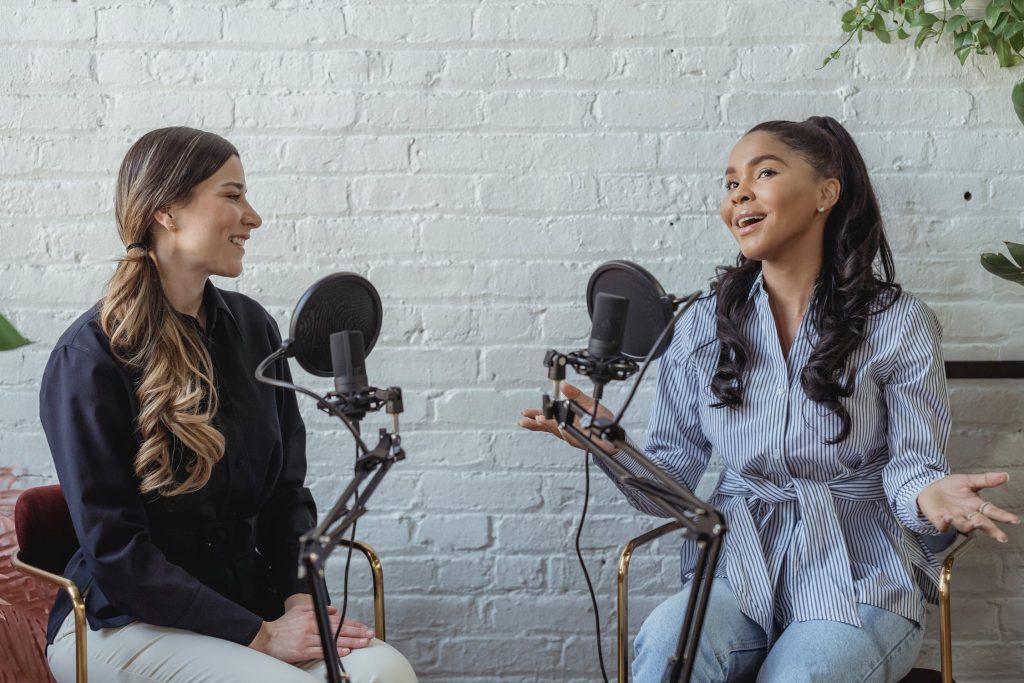February 3, 2022
You may have noticed that in the last few years, time and time again, every single business, public figure, or celebrity of virtually any status has created a podcast. This was more or less unheard of up until the last half decade.

Podcast growth has increased substantially year on year for the last 5 years, with an estimated 274.8 million listeners in 2019 to whopping 332.2 million in 2020 and a projected 504.9, (half a billion!), by 2024 according to Insider Intelligence. 2020, the year of the pandemic, however, saw further growth than any other year recently, including a doubling of Spotify podcast listeners in the fourth quarter of 2020 alone. Why is this? Largely, this is associated with the significant amount of extra time people had in general from lockdowns and isolation, as well as the possibility the feeling of loneliness many of us experienced through being solitary for so long, podcasts make you feel like you are part of the conversation and, for those struggling, a sense of human touch. The idea of even having a background noise as a conversation for those who were isolating, when all else was silent could have remedied their anxieties.
Given how in order to make a sustainable living from Spotify, you must have an extremely high number of recurring listeners and daily/weekly streams, it may seem odd that so many people are using podcasting to grow their brand, expand their horizons and for monetary purposes too. But why? The most obvious response is sponsors. Depending on the popularity of your podcast, sponsors, like Dollar Shave Club, Wix, Skillshare and the like will pay upwards of $30-40 per 1000 listeners for a 45-60 second advertisement, not to mention the affiliate benefits the podcast will get from using their ‘discount code’ at checkout. This, coupled with the facts that the podcasts will usually have sponsors relevant to their fanbase and that they can eventually become flywheels of passive income if successful, when an episode becomes popular and is listened to again and again, shows just how effective a podcast can be for growing a business, and why so many small, seemingly insignificant businesses or personalities will choose to start their own podcast.
You may ask yourself, wasn’t this platform originally known for its musicians? According to Statista’s research department, in 2020 25% of podcast listeners at age 18 or above claimed they used Spotify to listen to podcasts. The CEO of Spotify has, himself, explained that there has been a direct correlation between the number of users listening to podcasts who will also use Spotify to listen to music; “We have increasing conviction in the causal relationship between growth in podcast consumption driving higher [value] and retention among our user base”. Whilst it wouldn’t be unwise to assume that the large number of people listening to podcasts alone would detract from the retention rate for those listening to music, the CEO himself has conveyed this is blatantly not the case. The podcast-hungry fanbase of Spotify also enjoys their music too!
But all podcasts aren’t built the same. In the words of Thomas Frank, host of the now finished series of the ‘College Info Geek Podcast’, known as the ‘Informium’ in its latter episodes, without a fanbase or any form of audience, creating a podcast is just “…screaming into the void”. According to ‘SLAM Agency’, a popular podcast production company and podcasting agency, less than 20% of the podcasts produced this year will make it in to next year. That’s 4/5 podcasts not even making it one year!
There are a plethora of reasons why a podcast may be unsuccessful. According to Andrew Stapleton from the ‘Publish, Podcast or Perish’ Podcast, these are often associated with reasons such as the podcast being too niche, or not niche enough. In order to ensure the success of your podcast, you need to have a wide, general fanbase, or a very niche and well targeted fanbase. Most podcasts won’t make it past the first few episodes as the creators aren’t focused enough on consistency, when making your first blog, video, podcast or any piece of content, its likely going to be of poor quality and not pick up many views, that’s why patience really is a virtue in this industry! Speaking on inconsistency, without a rigid publishing schedule, your audience won’t be able to anticipate your next episode, and the algorithm for recommending your podcast to others will likely ignore your newest episode. And finally, whilst the beauty of podcasts are that they are cheap to produce, you will not have a good retention rate if it sounds like the podcast was recorded underwater.
Podcasts have been shown to be a net positive for Spotify and other streaming platforms, with their popularity only growing exponentially year on year. The industry is expected to grow at an annual compound growth rate of 31.1%, setting it to hit 98.4 billion USD in 2028 according to Grand View Research. We really are only seeing the tip of this industry’s iceberg.